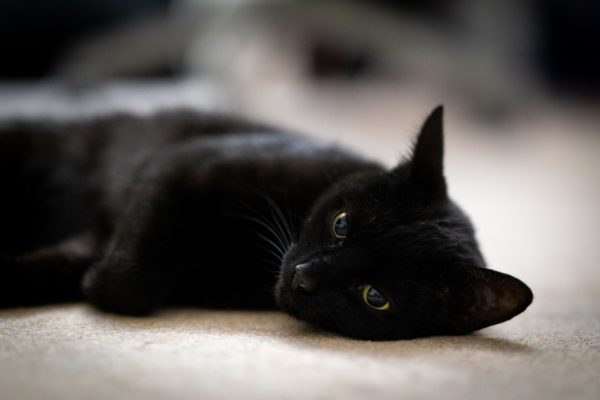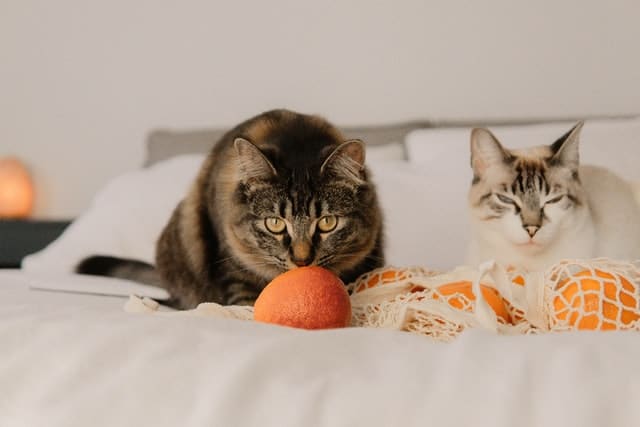Your cat’s digestive system is perfectly adapted to digesting meat, whether it’s a cat that lives outdoor or spends time at home. Then you wonder if a cat is a carnivore, can cats eat fruit? Can I give her citrus fruits full of vitamin C or can cats eat tangerines?
The food you choose for your pet has a significant impact on its health.
Immunity and the amount of energy in cats largely depend on their diet. Poor food quality or inadequate choices cannot satisfy all cats’ needs.
In order to live as long as possible, cats must eat healthily.
What does a healthy diet for cats mean? Are the healthy foods we eat also good for our furry pets?
We have dedicated this text to cats and fruit – so read it carefully and remember well to provide your pet with the highest quality snacks.
Tangerines
Tangerines are citrus fruit with a specific sour-sweet taste. They arrived in our region from Southeast Asia, only from the 19th century.
We all know how healthy tangerine is – it is full of vitamin C, which is important in the synthesis of elastin and collagen in our body. Vitamin C is known as an antioxidant that helps the body cleanse itself of free radicals.
Tangerines are rich in vitamin A, as well as folic acid, potassium, magnesium, copper, and calcium. We eat them when we have a cold; tangerines speed up digestion, dissolve excess weight, protect the heart.
Knowing how tangerines are good for our health, we have to discover what experts – can cats eat tangerines, and are tangerines safe for cats?
Tangerines and cats

Cat owners often ignorantly give their pets foods that are not good for their health.
Cats have a strong stomach that can digest, for example, a dog food if you gave it by mistake, but certain types of food can do serious damage to their body.
Do cats like tangerines?
Usually, cats don’t like tangerines. There is a myth that if you put tangerines around your Christmas tree, it will keep your cat away. Cats do have a very sensitive sense of smell – citrus fruits are very specific and too strong for your furry friend.
Can cats eat tangerines and are they dangerous for cats?

Are tangerines toxic for cats? The best answer is to avoid giving tangerines to your cat as you don’t know how she will react to its essential oils.
Cats and citruses are not the best combinations. Your feline should not eat tangerines (but also other types of citrus) because citric acid and essential oils from this type of fruit can seriously harm them.
What happens if a cat eats tangerine?
The peel from tangerine contains a high concentration of essential oils, and that is the most toxic part for your cat. The citric acid in tangerine can irritate a cat’s stomach, and the essential oils can affect the central nervous system of your pet.
Side effects of eating tangerines:
- Vomiting and diarrhea
- Muscle weakness
Keep in your mind that cats don’t need any nutrients from tangerines, as they produce vitamin C in their liver. Also too much vitamin C may cause kidney stones in your pet.
Cats also can’t eat limes, lemons, and grapefruit.
Some cats may get an extreme reaction to tangerines, so call your vet if you notice any of these alarming symptoms
- Vomiting
- Difficulty with breathing
- Lethargic and withdrawn for longer than a day
- Does not eat or drink for longer than a day
- Diarrhea or blood in feces
Have you ever heard of citrus poisoning in cats?

If your cat eats a citrus fruit, she may start showing symptoms such as vomiting, drooling, diarrhea, and weakness. If her skin comes in contact with citrus fruit, she may develop an allergic reaction like dermatitis.
Many cat owners are unaware that citrus fruits like lemons, tangerines, and oranges are toxic to cats as they contain limonene and linalool, and psoralens (1).
If your pet shows any signs of citrus poisoning, take her to a vet as soon as possible.
Cyanide poisoning in cats
The symptoms of cyanide poisoning usually begin about 10-15 minutes after your cat has been exposed to this toxin. The moment you see the symptoms, take your cat to a vet to prevent some serious health damage. React immediately if you spot some of these symptoms:
- Heavy panting
- Dilated pupils
- Difficulty breathing
- Vomiting
- Brick red colored gums
Cats and fruits
Fortunately, cats almost never take the wrong food, but they will always be interested in what you left on the table. Unlike dogs, cats haven’t changed significantly their needs and behavior living with humans. During evolution, cats evolved into strict carnivores and remained so to this day.
There are many benefits of eating fruit in a human diet, but as a pet parent, you have to ask yourself: can my cat eat fruit?
What fruit is good for cats – you might be pleasantly surprised but you shouldn’t avoid giving your pet all types of fruit.
You can feed your cat with these tasty treats as long as you stick to fruits that are safe for her.
What kind of fruit can a cat eat?

- Blueberries and cats
Blueberries are considered a superfood for humans, but what about cats? Yes, blueberries are a great source of minerals and vitamins for your cat too. They can be a fine treat for them because they are full of fiber and antioxidants important for the good health of your pet.
- Cats and strawberries
An excellent source of fiber, both mineral and vitamin C strawberries are the perfect choice for your cat. Chop the strawberries into small pieces so she can swallow them immediately.
- Cats and watermelons
Just like its name says, watermelon is full of water, therefore a great choice of fruit for your cat, especially if it does not drink enough water or moves a lot. Watermelon is full of fiber, water, and vitamins and a phenomenal treat for your cat.
- Cats and raspberries
Raspberries are from the same family as other berries. They are full of antioxidants, minerals, and vitamins, also vitamin C, vitamin A, potassium, calcium, manganese, and dietary fiber.
You can give your cat a maximum of 1-2 raspberries once in a while cause otherwise would be safe for your cat
Fruit that can be toxic or dangerous to cats
- Cats and grapes
Grapes are not recommended to cats, although there is no evidence that they are harmful to them. On the other hand, grapes are harmful to dogs, and that is why you should avoid it giving to your cat too.
If you see your cat eating grapes, check if they have a gastrointestinal problem such as vomiting, constipation, or diarrhea.
- Cats and plumbs
Plumb seeds contain cyanide that is toxic to your cat . One more thing – there is an excellent chance that the cat starts choking on plum seeds.
So if you catch your cat eating plumbs, stop her immediately.
- Cats and apples
Apples are full of vitamins, antioxidants, minerals, and calcium. Calcium is very important for bone health.
If you are giving your cat an apple, the only important thing is to remove the seeds. The seeds contain cyanide, which is extremely poisonous to cats. Cats are small, and that is why only a small amount of cyanide can be toxic to them.
Apple seeds, leaves, and stems contain cyanide, which can quickly cut off oxygen supply once consumed.
- Cats and pears
Pears got the fleshy part that is great for your cat and seeds that can be dangerous.
Cyanogenic glycoside can also be found in peach, apple, plum, apricots and can cause cyanide poisoning in cats (3). Just be careful when giving pear to your cat, taking care it hasn’t swallowed problematic part.
- Cats and bananas
Cats lack the enzymes needed to process plant foods. As a result, the cat finds it difficult to absorb bananas, and the body becomes overloaded.
- Cats and cherries
Just like with apples, pears, apricots, plumbs, it is not good if your cat eats the seed, stem, or leaves of cherry as they also contain a small amount of cyanide. It is not life-threatening if she has taken one or two, but don’t hesitate to take her to an expert if you caught her taking more.
Read Also: Can Dogs Eat Takis
So to sum up, can cats eat tangerines indeed?
Healthy eating has become imperative in the last decade.
To make it easiest to figure out which foods are best for your cat, remember that animals, just like humans, use a digestive system that hasn’t changed in thousands of years.
Look at your wonderful pet, and you will notice that it has incredibly sharp teeth and claws. Maybe your cat lives with you in the apartment, but hunting for other, smaller animals (birds, mice) is in her blood. Cats are carnivores and could not survive without meat.
You will not serve your cat a pigeon for dinner, but it is necessary to provide her with food that she can digest. In accordance with the text above, you can occasionally give a bite of fruit that is not toxic to a cat, and that’s it.
Do not try to feed it with fruits whose smell it cannot tolerate, such as citrus fruits.
